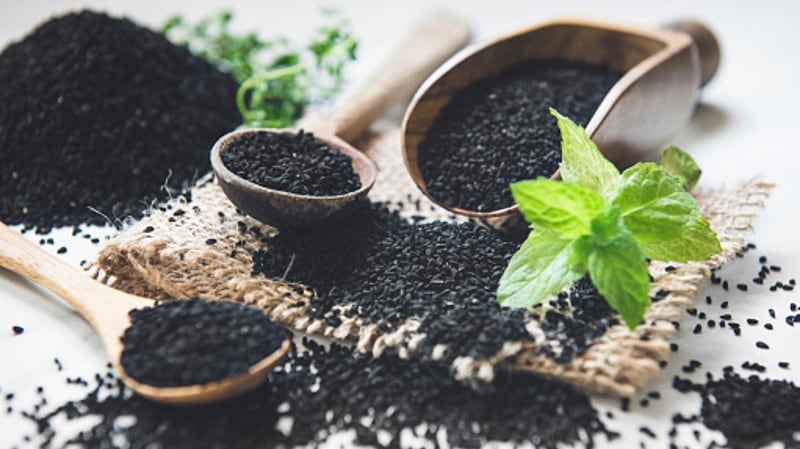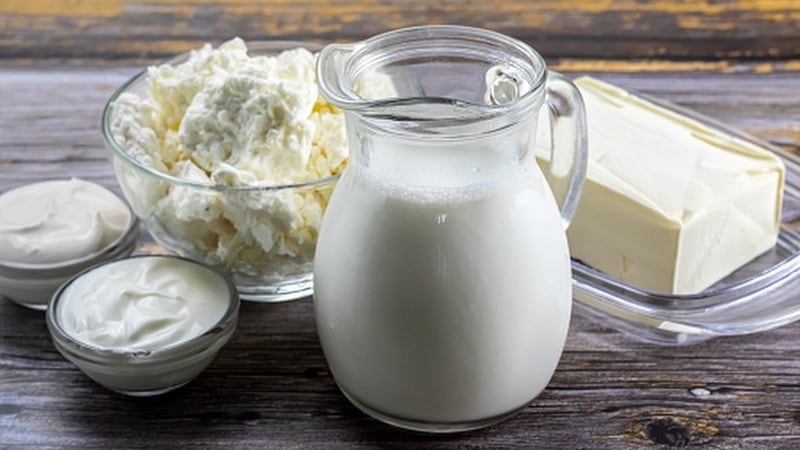Habbatussauda, which is commonly simply known as black seed or black cumin, comes from the flowering plant Nigella sativa and has been used in traditional medicine for many centuries in Indonesia and many parts of South East Asia.
The purported health benefits of these black seeds range from heart health to weight loss to memory boosting, anti-inflammation and as a remedy for coughs and colds. It is particularly revered by the Muslim community as it had been specifically mentioned by Prophet Muhammad as being able to heal ‘every disease except death’.
“Anlene Gold 5X habatussauda draws inspiration from Indonesia's rich medicinal flora including ginger, turmeric, dates, as well as habbatussauda which is much loved by Muslim consumers,” Fonterra Brands Indonesia Brand Lead for Anlene and Anchor Dairy Riszha Gandjar told FoodNavigator-Asia.
“These small black seeds have been used in traditional medicine for centuries [due to] their antioxidant, anti-inflammatory, and other potential health-promoting properties [and this Anlene variant] is the first adult milk in Indonesia to contain this.
“For consumers today, an ideal adult milk does not only come with standard health benefits any longer, [but needs to highlight] natural ingredients and local flavours.”
Anlene Gold 5X habatussauda has been formulated with no added sugar, and its soft launch timed to take place during the holy month of Ramadan in Indonesia in order to maximise appeal with Muslim consumers.
“We know that habbatussauda itself contains over 100 valuable nutrients including the active ingredients nigellone and thymoquinone; in addition to significant proportions of protein (21%), carbohydrates (38%) and plant fats and oils (35%),” she added.
“In addition to these, we also included ginger in this product, which has long had health claims attributed to it such as immune preserving abilities and treating colds.
“The idea [at the heart of this concept] was to marry science and tradition, and it is still early days but the product performed well in all key metrics during the concept and production stages.”
The new Anlene variant is now on the shelves of more than 2,700 stores all across Indonesia, with a formal product launch planned post-Ramadan.
Can habbatussauda truly cure all ills?
Muslim scholars have also not yet been able to come to a definite conclusion on the definition of ‘every disease’ as mentioned in the Holy Quran relating to habbatussauda, although many believe this could refer mainly to diseases with ‘chilly features’ such as flu.
“Based on the explanation from the scholars, it can be understood that the phrase ‘the remedy to all illnesses’ refers to certain illnesses only [in alignment] with the condition and situation of that time. Therefore, it is inaccurate to interpret [this phrase] literally because it may cause confusion,” the Malaysia Mufti of Federal Territory Office said via a formal statement.
“[So although] it is undeniable that habbatussauda carries many benefits in the medical field [as proven by] modern scientific research, society should not believe [this to be a] remedy or cure able to treat all sorts of illnesses in this world literally because this understanding is inaccurate.
“It is best to first refer [any medical issues] to medical experts with the knowledge and authority on diseases and treatments.”
Several of habbatussada’s benefits have been proven mostly thanks to its thymoquinone content, which confers pharmacological benefits including anti-oxidation, anti-inflammation, anti-apoptosis, and immunomodulation.
Data from a 2021 Bangladesh-South Korea comprehensive review into black cumin research found that these benefits could already potentially contribute to health benefits against a wide range of diseases, but that much more research is still needed in order to properly utilise this herb to its fullest potential.
“Although significant progress has been made in terms of pharmacological benefits of black cumin and thymoquinone, this ancient medicine is still far from [reaching] its clinical application,” wrote the researchers.
“The therapeutic use of thymoquinone is limited by its poor bioavailability [so] strategies such as structure modification [are needed to] improve its bioavailability [and] more human trials are needed to validate profiles for future clinical use.
“Also, in many cases, thymoquinone has often been credited for the pharmacological effects of black cumin regardless of the research focused on its health benefits [but] some studies have presented important findings on the significant health benefits caused by other phytochemicals [in black cumin] such as thymohydroquinone, thymol and carvacrol, suggesting that these compounds also deserve attention.”
That said, the study also concluded the existing evidence was sufficient to substantiate the pharmacological health benefits of black cumin covering many physiological systems in the human body, particularly in relation to anti-oxidation and anti-inflammation.





